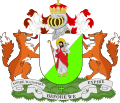Internet in New Eiffel
With a population of just five, 100 percent of the population of the Principality of New Eiffel had access to the Internet. As such, Internet access was considered to be a human right by the government. Due to the micronation's small size, it had a single fixed broadband subscription from British Internet service providers. Thirteen Internet Protocol version 4 (IPv4)s were allocated to New Eiffel, of which about seven saw active use. Nevertheless, New Eiffel had slow Internet connection speeds by European standards, averaging 47.01 megabits per second as of 1 February 2020. As a micronation, New Eiffel was not entitled to receive a country code top-level domain (ccTLD) from the Internet Corporation for Assigned Names and Numbers (ICANN). However, the government of New Eiffel had proposed to operate an alternative DNS root which would support the proposed domains of .ef or .eif. Prior to 1 April 2020, censorship of the Internet was "selective," until the New Eiffel Internet Law Act 2 was nullified after over a year of criticism.
Access and coverage
New Eiffel had only five residents, all of whom had Internet access—100 percent of the population. Internet coverage extended throughout the entire micronation, although Internet connection speeds in west Plitvice and east Új Repülő (near New Finland Monument) were weak. The principality had a single fixed broadband subscription consisting of a cable modem. Due to New Eiffel's small size, it subscribed to Internet service providers in the surrounding United Kingdom. New Eiffel had three routers—two in New Leeds and one in Új Repülő. Upon New Eiffel's foundation, its Internet service provider was Sky Broadband until early 2019, when it was switched over to the cheaper Zen Internet; New Eiffel later switched to BT Broadband in January 2020 due to complaints over slow Internet connection speeds. Internet coverage from nine Internet service providers from the United Kingdom reached the micronation. Thirteen Internet Protocol version 4 (IPv4)s were allocated to New Eiffel, of which about seven saw active use.
Websites

As a micronation, New Eiffel was not entitled to receive a country code top-level domain (ccTLD) from the Internet Corporation for Assigned Names and Numbers (ICANN). However, the government of New Eiffel had proposed to operate an alternative DNS root in order to create their own custom top-level domains. The government proposed the domains .ef or .eif, as .ne was already allocated by ICANN for Niger. The government did not wish to use said domain as a domain hack for New Eiffel. In March 2019, New Eiffel registered .eif on NationDNS, a subsidiary of MNations Hosting that aimed to provide micronations with custom ccTLDs on its own alternative DNS root. Although the domains were expected to go live as early as 28 May, the project became dormant.
The first website launched locally with an independent domain in New Eiffel was that of XCUT Therapy, which had existed prior to New Eiffel's foundation. It was hosted at .org. This was followed by ZSR Film Reviews (.com) in November 2018; an official website for New Eiffel (.blog) in August 2019; and Journal en Eiffel (.ml) in August 2020. Several other websites, such as the New Eiffel Roads Index and The New Eiffel Times, did have their own websites, however they were hosted as subdomains of websites such as Google Sites and Wordpress rather than independently.
Internet connection speeds
Internet connection speeds were slow by European standards. On 1 February 2020, the average connection speed from a fixed broadband subscription was 47.01 megabits per second (Mb/s), with 15.82 upload speed and 7 milliseconds ping. This was noticeably slower than the United Kingdom's average speed of 64.09 Mb/s, then-ranked 45th in the world, and would have ranked New Eiffel 60th macronationally ahead of Montenegro (46.42 Mb/s) and below Brazil (48.75 Mb/s). Micronationally, it ranked ahead of the Sixth Aenderian Republic (27.34 Mb/s, akin to Sri Lanka at 92nd) and just below the Grand Duchy of Australis (47.73 Mb/s).
Censorship
Prior to 1 April 2020, the Internet in New Eiffel was subject to "selective" censorship according to the criteria from the macronational Freedom House.
The New Eiffel Internet Law Act 1 was introduced in late August 2018, and amended by the New Eiffel Internet Law Act 2 on 24 December. It gave the government the ability to ban websites containing material that was considered to be in violation of said act. Websites that could be censored included websites containing material that offended the dignity of a politician; accusing authorities of corruption "without proof or proper sources;" promoting gambling; promoting extremist ideologies; forks of 4chan; and promoting "the idea of more than two genders and a gender spectrum." Websites containing material that would be banned outright included websites promoting hate speech; selling or promoting illegal drug use; selling sex toys that could cause bodily harm; promoting criminal activity and organisation; and hosting copyrighted audio, videos and other material without permission.
However, the act was never enforced outside of the ban on 4chan. Da Nart, a New Eiffelic website founded in December 2019 for North New Eiffelic speakers, added translated subtitles to media and video games such as the Japanese animated series Aggretsuko and video game Super Mario Bros.. The translations were done by public contributors, and the viewing and downloading of such content was illegal within the micronation. Nevertheless, the website remained unbanned.
The act was heavily criticised by external observers in early 2019, and later by New Eiffelic politicians in late 2019 who advocated for its reform. Between November and December 2019, Zabëlle Skye, founder and then-Prince of New Eiffel, attempted to amend the act to unban 4chan and allow websites to advocate for gender identity politics. However, he accidentally deleted the constitution on 14 December, resulting in a crisis that brought the passing of new acts of parliament into question. With the adoption of the second constitution of New Eiffel on 1 April 2020, the act was nullified.

